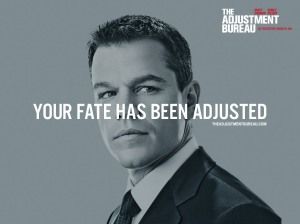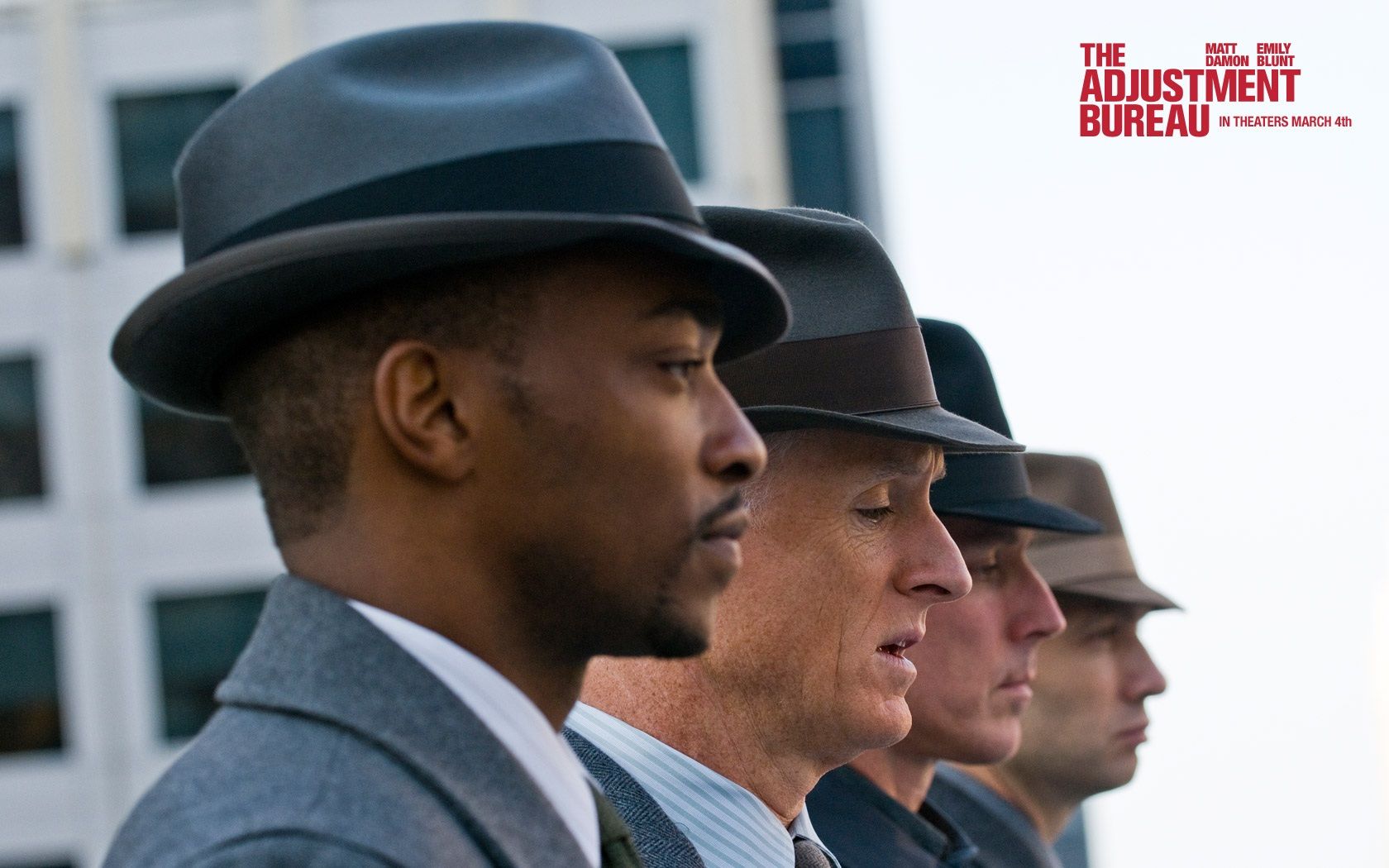
Zoe & I watched The Adjustment Bureau this weekend and it got me thinking about a few things. As Saturday night entertainment goes it’s a pretty little flick; at only 1hr 40m it certainly doesn’t feel long. It’s loosely based on a short story by Philip K. Dick, which explains why, as genres go, it’s a bit difficult to label. As you would expect from Dick it’s got his kinda science-fiction edge, whilst also resembling something of a Bourne-style thriller, yet at the heart of the plot is the romance of its two main characters. David (an upcoming politician) and Elise (a contemporary ballet dancer) are played by Emily Blunt and Matt Damon, and together they form a great combo. With Blunt’s charm and good banter and Damon’s clean-cut cool and Bourne-composure, they essentially make the film. It’s also shot on location across New York City by Director George Nolfi, and I’m sure if I was more familiar with the city then I’d echo Damon’s comment that the film reads as something of a love letter to the city. My intention in the next few paragraphs isn’t to reveal every twist and detail of the plot, but please still take this as something of a spoiler warning!
Religion as inherited out-of-touch morality: escape ‘the Plan’!
As a film its blend of genres make it feel quite strange and it seems for that reason it’s received mixed reviews, but it certainly raises some really interesting issues, mainly pertaining to the role of the Bureau that makes up the film’s title. This Adjustment Bureau are a mysterious group of men, a sort-of cross between the Agents in the Matrix and a divine legion of guardian angels. Except that these guys aren’t guarding you for your sake; they’re guarding and ‘adjusting’ your life to ensure that it all goes ‘to plan’. This higher plan is central to the plot of the film, and its a clear allusion to the belief that there is a divine being who has a set plan for your life, only that in the film the God character is not-so-subtly known as ‘the Chairman’. As the AB adjust David & Elise’s lives to ensure the Chairman’s plan is carried out, it not surprisingly raises issues such as predestination, free will, and working out your destiny.
To make this more interesting you also get Anthony Mackie playing a renegade member of the Bureau, Harry. He’s assigned to Damon’s character and tasked with ensuring the relationship between David & Elise fails to develop. But as Harry sees how the couple ooze with a sense of ‘meant to be’, he faces a crisis of confidence. This leads him to have second thoughts about the whole plan thing. It seems his role is effectively the Suddenly-Questioning-The-Religious-Framework-I-Grew-Up-With character, and so we see him beginning to realise that he doesn’t know why ‘the plan’ is good, after all that’s only what he’s been told. Consequently he begins to question whether he can be sure the chairman is always right. As Harry interacts with David, the latter encourages him to think whether any of us really needs the plan anymore. This is surely a picture of the mood-of-our-age in the west, as we increasing believe we need to throw off the shackles of our inhibiting religious heritage, and become free to be ‘whoever we really are’. Because David & Elise’s relationship seems so clearly right, then surely the plan is wrong. As such, the ‘gods’ that our forefathers have passed down to us are now out-of-touch and inhibiting, and any inherited morality that either we can’t really explain or doesn’t fit with our experience needs to be thrown out.

The AB agents are made to look pretty pathetic as they invest their lives in a plan that they can’t really justify and that appears so unreasonable. I guess that’s often the stereotype of Christians: believing something they’ve been told to believe, without really knowing why. When our experience seems to be so persuasively saying something contrary, as the Damon/Blunt chemistry exemplifies so well, then surely that must trump any rules or morality that’s been passed down to us.
This reminds me why it’s so important that as Christians we know what we believe, but also why we believe it. Do we have reason for our faith and our faith-prompted life decisions and values? If we drift into simply teaching a morality from our pulpits, then eventually experience and culture will question it and we’ll find we have neither the reasons or truths that should be undergirding any Christian ethic. Whether that be a hotpoint of our culture like heterosexual marriage or abortion, or just the day-to-day lifestyle issues of the Christian life, we need to understand and articulate clearly the ‘why’. In the New Testament the apostles go out of their way to teach that Christian ‘actions’ comes from a knowledge of God and his gospel, i.e. a theology. As we pastor people, especially in grounding new Christians, do we effectively communicate this, or, because it’s easier, do we simply give rules and actions? There’s an interesting series of posts on this tendency to teach legalism, over at the Gospel Coalition at the moment. If we treat Scripture like a box of Celebrations, simply plucking out exhortations to a particular lifestyle without really teaching Scripture as it comes, complete with its gospel-centred motive or ‘engine’, then no wonder that we’ll end up abandoning that behaviour when it’s questioned.
More thoughts to come, but what do you reckon? Why not click on the speech bubble at the top and share your thoughts.